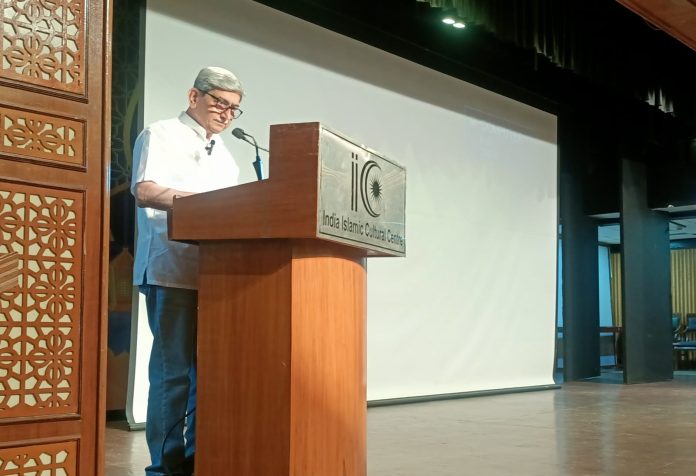Dr. Mohammad Aslam Parvaiz, former Vice Chancellor of Maulana Azad National Urdu University, currently serving as Director of Islamic Foundation for Science and Environment in Delhi, delivered a lecture on “Quran on Humanity.” The event was organized by India Islamic Cultural Centre on Sunday.
Dr. Parvaiz said the Quran’s teachings are fundamentally centred on humanity. Quoting verses from the Quran, he remarked, “As all human beings are descendants of Adam, we are inherently brothers and sisters. The Quran affirms this bond of kinship, highlighting that diversity exists only for the sake of identification. Individuals are valued based on their contribution to humanity, and the most honourable in the sight of Allah are those guided by Taqwa (total submission to Allah), not by their tribal affiliations or clan.”
He continued, “The Quran’s message is universal, revealed for the benefit of all humanity. It offers guidance – whether one chooses to follow it or stray is their own decision. Prophet Muhammad ﷺ conveyed the message, and it is now upon humanity to choose their path. The Quran describes the Muslim community as the best raised for mankind, enjoining what is right and forbidding what is wrong.”
Citing the Quranic verse (49:13): “O humanity! Indeed, We created you from a male and a female, and made you into peoples and tribes so that you may know one another. Verily, the most honorable of you with Allah is the most righteous among you,” he explained that differences in culture, ethnicity, and background are meant for mutual learning and respect, not division. Humans are given freedom to choose between right and wrong, but they are also held accountable for their choices in the Hereafter. The Quran reminds us of the temporary nature of this life and the eternal consequences of our actions.
Dr. Parvaiz stressed that the primary purpose of the Quran’s revelation is to encourage reflection upon its verses. The Quran offers deep insights into human life, addressing spiritual, moral, and social dimensions. It provides guidance on human creation, purpose, responsibility, and destiny, aiming to enhance both personal conduct and societal well-being.
He added, “The Quran presents a comprehensive view of humanity, balancing personal responsibility with collective welfare. It stresses individual morality, justice, compassion, and societal harmony while acknowledging human limitations. Through its guidance, the Quran calls humanity toward spiritual growth, mutual respect, and preparation for the Hereafter.”
Citing another verse (4:1), “O humanity! Be mindful of your Lord who created you from a single soul, and from it created its mate, and through both, He spread countless men and women,” he underlined the concept of a shared origin for all humans, promoting equality and unity.
He concluded, “The Quran promotes living in harmony with divine will, which includes acts of kindness, justice, and compassion. Humans are entrusted as stewards of the earth, responsible for justice, caring for the environment, and ensuring social harmony.”




